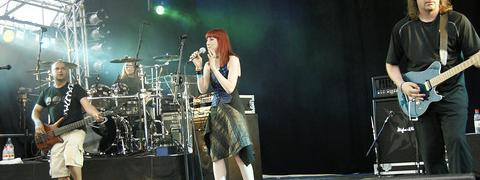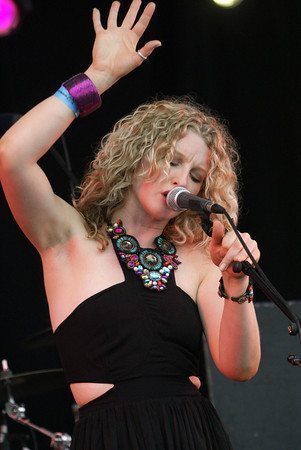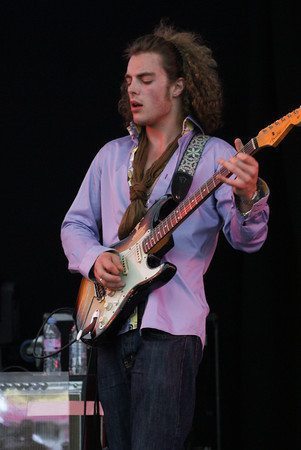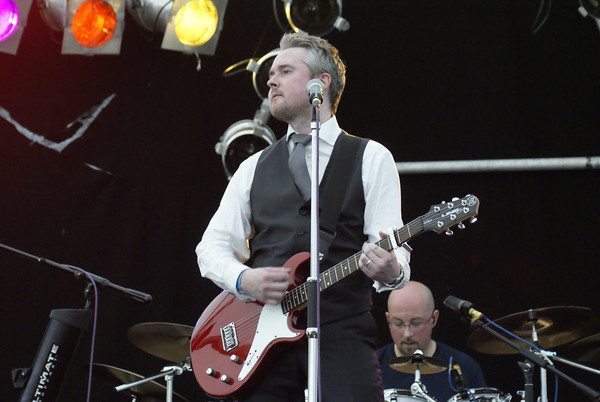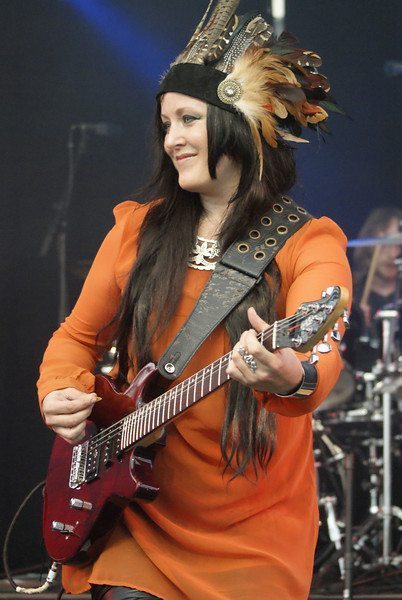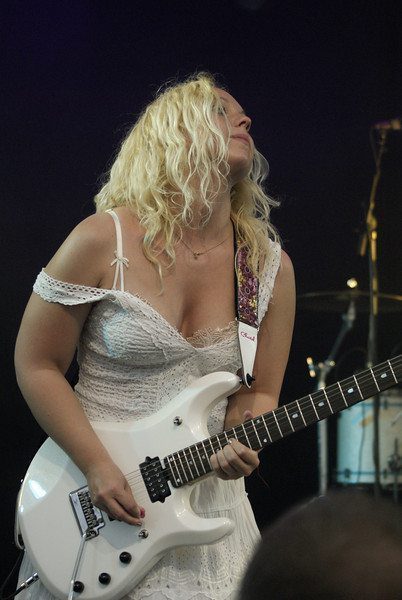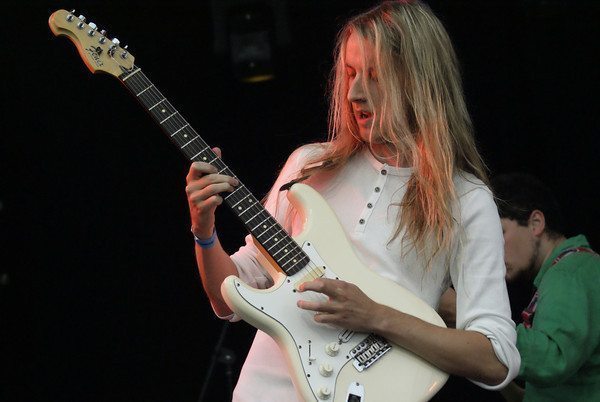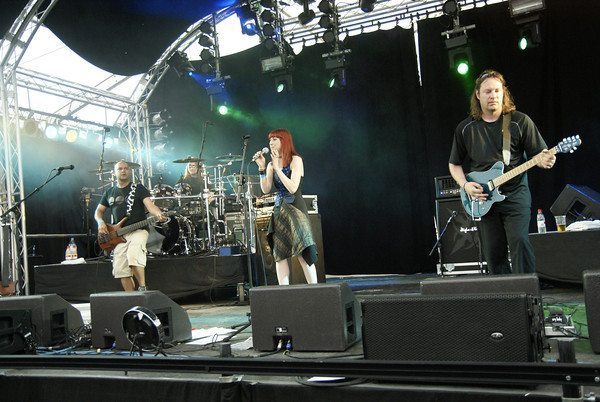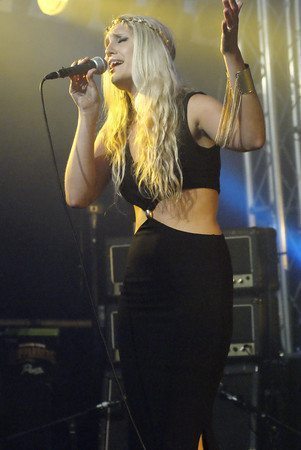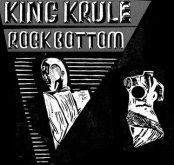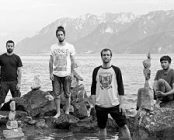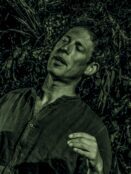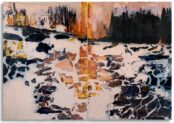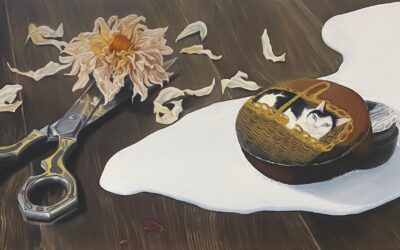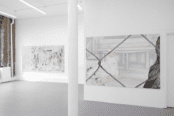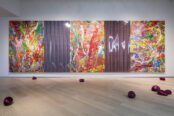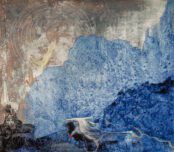The Cambridge Rock Festival is one of the many smaller so-called “boutique” festivals held up and down the country.
The festival focuses on classic rock, blues and progressive rock, and can sometimes feel like stepping into a parallel timeline where punk never happened and real musicianship never went out of fashion. With the stages under cover in large marquees it’s a lot harder for the typical British summer to put it’s usual dampener on things.
It’s a small and very friendly festival, and you see many of the same faces year after year. Add to that the number of bands that return year after year and it can sometimes feel more like a large private party than festival. For many of the regulars, that’s a big part of the appeal; it’s quite unlike the bigger corporate festivals. And we mustn’t forget the beer! Given the event’s origin as a beer festival, there is an enormous selection of reasonably-priced real ales rather than the overpriced warm lager you get at big corporate festivals.
[box] an enormous selection of reasonably-priced real ales[/box]
Thursday night is a warm-up, with tribute bands on the main stage and local bands on the smaller stage. While tribute bands aren’t my thing, I was still impressed by The Ultimate Eagles. Enthusiastically fronted by Danny Vaughan, they’re a bunch of talented musicians paying tribute to The Eagles‘ music rather than pretending to be The Eagles. Although I’d still have preferred to see Danny Vaughan playing his own songs.
Friday always seems the start of the festival proper, and a couple of early acts made a strong impression. Paradise 9 played psychedelic space-rock with cockney-punk vocals, combining politically-charged songwriting with extended instrumental jams featuring clarinet solos, effects laden guitar and knob-twiddling electronic effects, anchored with some amazingly tight bass grooves.
In contrast, the youthful Virgil and the Accelerators delivered some high-energy guitar-shredding electric blues in the classic power trio format. I’m sure we’ll be hearing more from them in the coming years.
The Heather Findlay Band were the first high-profile act of the day. Opening with “Black Rain”, the former Mostly Autumn frontwoman and her band proceeded to play a mix of reworked Mostly Autumn and Odin Dragonfly oldies with songs from Heather’s 2011 solo EP The Phoenix Suite. Heather made the point of it being a band, not a solo artist, and although Heather is a charismatic performer and a class act as a vocalist, she’s put together band talented enough that the whole is far more than the sum of the parts.
In particular the live shows are almost as much about Dave Kilminster’s fantastic lead guitar playing as they about the vocalist. As with her shows last year, the reworked arrangements transform many of the older songs. For example, the acoustic Odin Dragonfly number “Magpie” turned into something approaching metal, and many Mostly Autumn songs work well in all-guitar format. It was slightly disappointing that there was nothing completely new in the set, and it didn’t quite match the intensity of their short tour last November, but it was still a solid performance that went down well with the crowd.
After that, it was over to the second stage, sponsored on Friday by the Classic Rock Society, to catch Sankara. Sankara are a four-piece formed from two former members of The Reasoning and two of The Bluehorses, fronted by former Reasoning vocalist and keyboard player Gareth Jones. They played a great set of highly melodic hard rock drawn from their EP Enigma and their first full-length album Guided by Degrees. It’s great to hear Gareth’s vocals again; his voice was always somewhat underused as one of three singers in his previous band.
Jay McDonald’s guitar added a shredding metal edge, although there were moments when I felt an additional instrument would have added to the sound. Certainly many of the best moments were when Gareth sang from behind the keyboards. It’s still early days for this band, and it will be very interesting to see how they develop.
Jump were on next on the CRS stage. They’re one of those bands who are hard to pigeonhole. Their music isn’t complex or extravagant enough to be obviously prog-rock, and not quite rootsy enough to be folk-rock, but they’ve got elements of both, and played an enjoyable if unspectacular set. Frontman John Dexter Jones has a very storytelling style of songwriting that seems to draw a lot from the folk tradition, and it was his really compelling stage presence that made them an entertaining live band.
Winter in Eden took the special guest spot on the CRS stage, scheduled against It Bites on the main stage, by far the worst clash of the weekend. They’re a British take on the European symphonic metal genre, fronted by the very talented Vicky Johnson, and this high profile gig saw them rise to the big occasion and play an absolute blinder of a set. With a 75 minute set drawing heavily from their second album Echoes of Betrayal, they didn’t need the choirs, orchestras and kitchen sinks of the more extravagant bands in the genre. The fluid lead guitar, neo-classical keyboard flourishes, and Vicky’s superb voice was more than enough. By all accounts It Bites were superb on the main stage, but Winter in Eden were worth missing them for.
[Editor’s note: In the grand tradition of rock writer’s, ahem, delegation, Tim Hall dispatched his niece, Hannah Bowstead, to cover It Bites:
I’d never seen It Bites before, but I’d heard about them and listened to a little of their music, so I knew what to expect. And they were brilliantly proggy! They played a mixture of old and new material, which I really liked – it was good that I, as an It Bites newcomer, could get a flavour of all their music, instead of just old or just new. They also played several tracks from their new album, Map of the Past, including ‘Send No Flowers’ and ‘Clocks’ (which is so catchy that my brother has been singing it for days now!). I was very impressed with their set, which had a good mixture of styles and volumes – so impressed that afterwards my dad and I went to their merchandise stand to buy Map of the Past on the strength of that one set alone!]
Bonkers metal trio Kyrbgrinder finished the day’s proceedings on the second stage. They’re led by drummer Johanne James, who fronts the band from behind the kit, playing full-on metal drums and singing lead at the same time. Despite some ferocious shredding guitar, if anything it’s Johannes’ drums that are the band’s principle lead instrument. There’s something of the intensity of Rage Against The Machine in their delivery, and Johannes has a magnetic stage presence as frontman. I’m not quite sure how he does it.
After that there was just time to catch the end of Focus‘ headline set on the main stage, which turned out to be a twenty-minute extended version of “Hocus Pocus”, every bit as bonkers as Kyrbgrinder, complete with a lengthy drum solo.
After some good old-fashioned down and dirty rock and roll from Silverjet, which is really what you need to wake everyone up in the morning, Stolen Earth were the first of several eagerly anticipated bands of the day on the main stage. A year earlier they’d played their very first gig on the same stage. A year on, with a quite a few gigs and superb début album under their belts, they made a triumphal return. They’ve got a big atmospheric sound, and Heidi Widdop’s soulful vocals give them a lot of emotional depth.
[box] There is nothing quite like a real Hammond. [/box]
It’s noticeable how much Heidi’s acoustic guitar is an integral part of their sound, frequently playing the chords of the song while Adam Dawson’s guitar and John Sykes’ keys add colour. Highlights included a beautiful semi-acoustic “Soul in a Jar” with Heidi’s very evocative Low Whistle, some great Floydy slide guitar from Adam on “Into the Virgin Snow”. “Silver Skies”, prefaced with an extended volume-control solo from Adam bought a lump to the throat, and they ended with the anthemic “Perfect Wave” with some great Hammond organ playing. There is nothing quite like a real Hammond. This was one of the best performances is the band’s short history, and you could tell they knew it.
Many bands would have found that tour-de-force hard to follow, but Panic Room are not any band. Fresh from a short tour promoting their critically-acclaimed third album SKIN they too delivered a superb and intense set. Beginning with the prog-metal of “Song For Tomorrow” the set showcased their new album, with only a couple of older songs in the set. One particular highlight was the jazz-flavoured “Chameleon”, enhanced by some “Great Gig In The Sky” vocals from Anne-Marie Helder on the closing section.
As we ought to have come to expect by now, at one point bassist Yatim Halimi jumped off the stage into the photo pit and went walkabout in the crowd, then seemingly got lost somewhere backstage, all the time continuing to keep playing. They did find time for their swamp-blues cover of “Bitches Crystal” which I much prefer to ELP’s original. They ended with an emotionally powerful version of the title track of the album, then rocked out with a monstrous “Hiding the World”. It’s the sort of performance we’ve come to expect from this band, and they really deserved to have been far higher up the bill.
Chantel McGregor has feet in many camps. She’s both a blues artist and a rock one. She’s both a virtuoso guitarist and an accomplished singer-songwriter. A few weeks earlier she’d supported the blues legend Robert Cray, and completely stole the show. Her performance on the CRF stage demonstrated just why. Beginning with a new and as-yet-untitled instrumental number, her set mixed originals from her 2011 début album Like No Other with incendiary takes on blues standards.
She’s a phenomenal guitar player, and a strong vocalist too, with a great down-to-earth stage presence. There were many highlights in her all-too-short set, but particular standards were “Caught Out”, a near-metal song written in response to a forum troll, and a spectacular cover of Joe Satriani‘s “Up In The Sky”. She may not yet have the name recognition to top the bill, but that was surely a headliner-quality performance.
Sadly the first half of the bill turned out to be the better half. The next band were X-UFO, a motley assortment of bit players from the UFO story, fronted by Danny Peyronel, who played keyboards on their No Heavy Petting album. When their set relied on UFO standards like “Lights Out” and “Doctor Doctor”, they were little more that a glorified tribute band, and an average one at that. True, the actual songs are all-time classics, and were performed at least competently. But I’d much rather hear those songs performed by a band containing either Phil Mogg or Michael Schenker, and this band contained neither.
[box] Again, there is nothing quite like a real Hammond[/box]
Verdon Allen’s Softground were woefully bad. The keyboard player from Mott the Hoople started off with a glorious wash of Hammond organ (Again, there is nothing quite like a real Hammond), but it all went south the moment he opened his mouth; his vocals were desperately weak, and the instrumentation just wasn’t strong enough to carry it. After quite a lot of forgettable original material he ended up by murdering Mott’s “All The Young Dudes”. It was painful to watch. I suppose every festival must have one dud, and Verdon Allen was certainly a dud.
Swedish rockers Bonafide were far better, tight blues-based hard rock played with a lot of energy. Their brand of back-to-basics rock’n’roll isn’t really my thing, but they were undoubtedly very good at what they did, and went down well with large sections of the crowd.
70s Canterbury scene veterans Caravan topped the bill on Saturday. They’d made a strong impression as special guests the year before, but this year I found them a little disappointing; they didn’t quite have the energy and passion this time round, and it wasn’t until quite a long way into the set that things really got going. Still, their quirky oddball hit “Golf Girl” was fun, and things did finally come to life with the jazz-prog epic “Nine Feet Underground”.
Maschine, formerly known as Concrete Lake, opened Sunday’s proceedings. They’re one of the new breed of progressive rock artists who avoid retro 70s sounds in favour of something much more 21st century. The set featured some stunning musicianship, especially from guitarist Luke Machin, some great male/female vocal harmonies, and even a bit of cookie monster vocals.
Occasionally the songwriting took second place to extended jazz-metal guitar workouts, but there were enough strong tunes to mark them as a band to watch in the coming months and years. Not at all bad for a band whose average age was probably less than half that of the audience, especially when they were missing their second guitarist and playing as a four-piece. You’d never have known they were a player short.
Flamborough Head, in contrast, were far more old-school. The Dutch band showed strong influences of 70s Genesis and Camel, with their lengthy instrumental passages and some very retro keyboard sounds. Frontwoman Margriet Boomsma has a great voice, perhaps underused given the material, and spent as much time playing flute as singing. Still, noting quite evokes the spirit of folk-tinged 70s prog-rock as flute backed by Mellotron, and it made for an enjoyable set.
Mr So and So are another band playing the festival for the second year running with their song-focussed blend of prog, metal and hard rock, and made a significantly stronger impression than they did a year earlier. They make great use of dual male/female lead vocals, with Shane McGowan and Charlotte Evens frequently swapping leads on alternate lines and doing interesting things with harmonies. Guitarist Dave Foster delivered some spectacular fretwork pyrotechnics, especially on the ten-minute closing epic “The Visitor”, which I’m sure quoted a section of Twelfth Night’s “Fur Helene pt 2”.
After Stampede‘s NWOBHM blast from the past, the voice of Jeremy Irons intoning “Through oceans of time” heralded the mighty Touchstone. They last graced the CRF stage back in 2009, now they returned as conquering heroes. From Moo Bass’ machine gun bass riff to start the monstrous title track of “Wintercoast” through to their manic singalong cover of “Mad World” the high-energy set did not let up.
They drew from heavily from both Wintercoast and the more recent The City Sleeps, mixing elements of metal and prog-rock without falling into the clichés of prog-metal. Yet again Kim Seviour demonstrated how she’s one of the best frontwomen of any band of their level, she’s very good at improvised interaction between the songs, a far cry from the scripted stage announcements of your typical stadium rock act. This was an assured performance by a self-confident band who see on the cusp of far bigger things.
Don Airey, current keyboard player for Deep Purple, has played as a sidesman to many of the greatest names of rock history, and has the charisma of rock star in his own right rather than being a mere session muso. Starting with a keyboard-heavy version of Rainbow‘s “Spotlight Kid” he and his well-drilled band ran through a greatest hits set taking in the likes of Ozzy Osborne‘s “Mr Crowley” (which tested the mettle of the guitarist), and Deep Purple’s “Child in Time” (which tested the mettle of the singer). It was an obviously crowd-pleasing set, performed with both precision and enthusiasm, and predictably went down a storm.
It was clear that Mostly Autumn would have to pull out all the stops to follow that, and that’s precisely what they proceeded to do. Although the band had just recorded a new album, they decided to hold the new material back for their forthcoming tour, and play a greatest hits set for the festival crowd. Introduced by Olympic torch holder Ben Parkinson, and beginning with Iain Jennings’ instrumental “Distant Train”, the set ranged from the hard rock of “Deep in Borrodale” through the electric folk-rock of “Dark Before The Dawn” to the atmospheric epic “The Last Climb” with Anne-Marie Helder’s extended flute solo.
It’s more than two years now since Olivia Sparnenn stepped up from being a backing singer to fronting the band, and she completely nails older songs like “Evergreen”, for so long one of Heather Findlay’s signature songs. One of her own songs, the big rock ballad “Questioning Eyes” was perhaps the high point of the entire set. One surprise was the stripped-down version of Olivia’s “Rain Song” accompanied just by piano and flute. They ended, as they always do, with “Heroes Never Die”, dedicated on this occasion to the late Jon Lord. As with the best of their shows last year, this was a display of passion and emotional intensity.
Then it was Snakecharmer‘s turn to pull out the stops. Snakecharmer are a supergroup based around a nucleus of Micky Moody and Neil Murray of the pre-MTV incarnation of Whitesnake, featuring former Thunder drummer Harry James, one-time Wishbone Ash guitarist Laurie Wisefield, and for this gig, John Young on keys. They’d played the festival a couple of years back under the moniker of “The Monsters of British Rock” after David Coverdale’s lawyers had taken exception to the name “The Moody Murray Whitesnake”, and were good but not great.
[box] Ousey sang the correct “Hobo” while large parts of the crowd sang the MTV-era “Drifter”. [/box]
This time they raised their game. even though Chris Ousey doesn’t quite have Coverdale’s charisma, he’s voice is good enough to do the songs justice, and the quality of the blues-rock era Whitesnake songs is undeniable. They played all the obvious standards, drawing heavily from “Ready and Willing”. One amusing moment was on “Here I Go Again” when Ousey sang the correct “Hobo” while large parts of the crowd sang the MTV-era “Drifter”. John Young, standing in at relatively short notice made a particularly strong impression on keys, although I’d like to have heard a bit more of Laurie Wisefield’s guitar; Micky Moody took most of the solos. Still, despite being an obvious nostalgia-fest for rock fans of a certain age, it had enough of a feelgood factor to end the festival on a high.
You could criticise the festival bill for relying on unashamed nostalgia acts as headliners, and especially for the way more forward-looking acts like Maschine, Winter in Eden, Kyrbgrinder or Panic Room were either low down the bill or placed on the second stage. But on the other hand, you could equally well argue that it’s a case of the festival knowing its audience, and the once-big names from the 70s draw in the crowds who are then exposed to the newer acts that have something to say.
Whatever next year’s bill might be, and I suspect we may see quite a few of the above names return yet again, the 2013 Cambridge Rock Festival is already in the diary, and it’s one to look forward to.
All photos: Tim Hall

